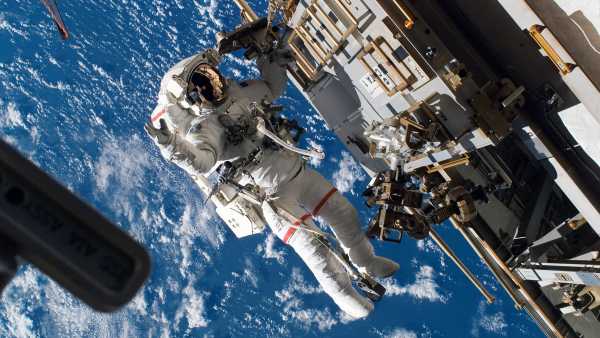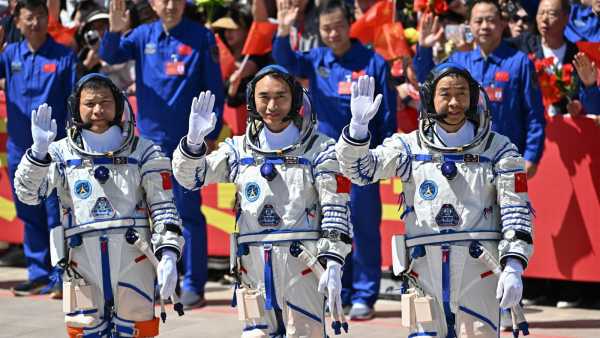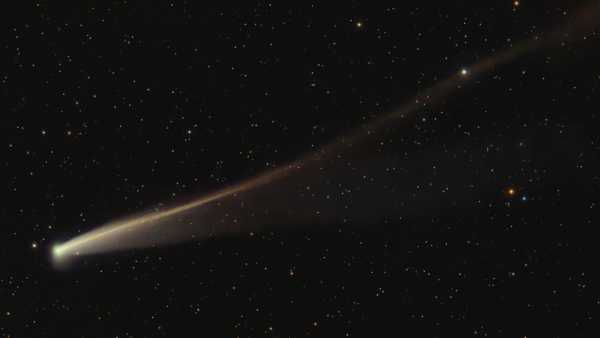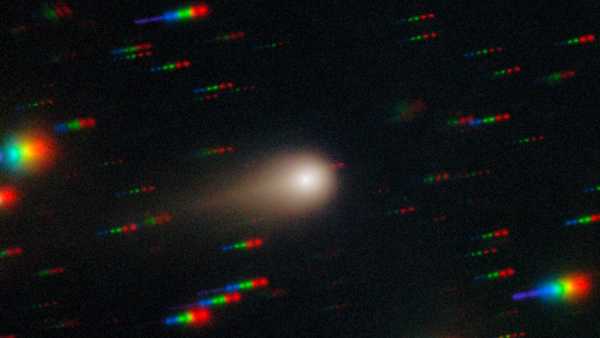
Astronaut Rick Mastracchio during a spacewalk during the shuttle Endeavour mission to the International Space Station in 2007. Image used for illustrative purposes only. (Photo: NASA via Getty Images)
A new study has found that human stem cells deteriorate and age much faster in space, posing a problem for those planning long-term travel through our solar system.
Scientists have used artificial intelligence (AI) to track changes in stem cells delivered to the International Space Station (ISS) on SpaceX resupply missions. In space, the stem cells partially lost their ability to generate new cells, became more susceptible to DNA damage, and began to age faster, the researchers said.
The findings, published Sept. 4 in the journal Cell Stem Cell, build on previous space medicine research that highlights the challenges of keeping humans in space for long periods of time — challenges that humanity will have to overcome if it wants to colonize other planets like Mars.
You may like
-

Spaceship carrying cannabis and human remains crashes into ocean
-

Chemotherapy can make healthy blood cells 'look old'
-

Science News This Week: A 400-Year Journey to Alpha Centauri and the Evil AI That Could Make Us Think About It
“Space is a true test of the human body’s endurance,” said study co-author Catriona Jamieson, director of the Sanford Stem Cell Institute and professor of medicine at the University of California, San Diego. “These findings are critical because they show that space stressors, such as microgravity and cosmic galactic radiation, can accelerate the molecular aging of blood stem cells.”
The human body is not designed for space. Up there, our species is exposed to entirely different environmental stressors. The two most significant stressors that cause harm are the near-zero gravity of microgravity and cosmic radiation—tiny subatomic particles that move rapidly through space.
Previous studies have documented that humans experience a variety of adverse health effects in space. For example, a 2022 study found that astronauts who spend more than six months in orbit experience decades of bone loss; scientists have even suggested that colonizing Mars may require some DNA modification to help our bodies adapt to life away from our home planet.
In the new study, the researchers looked at hematopoietic stem and progenitor cells (HSPCs). These cells regulate the health of the immune system and immune surveillance of cancer cells. Previous studies have shown that exposure to microgravity can affect immune and metabolic changes, but not how space exposure affects the molecular integrity and functional capacity of HSPCs, the study says.
The team obtained human bone marrow cells from consenting hip replacement patients and then grew them in a nanobioreactor, a vessel capable of facilitating biological reactions. The researchers conducted their experiment on Earth and during four missions to the ISS.
Using AI-powered imaging tools to monitor cell activity, the scientists noticed that the cellular changes in the space samples were similar to those seen during normal cellular aging on Earth, but at an accelerated rate. For example, the cells were more active than normal and lost their ability to rest and repair. According to the study, the researchers also observed increased activity in part of the “dark genome” — poorly understood regions of the genome associated with stress responses and aging.
RELATED STORIES
— Ghostly 'spiral' photobombs from Perseid meteors are appearing over several US states — and experts aren't sure what's causing them.
— Jim Lovell, commander of NASA's Apollo 13 moon mission, has died at age 97.
—SpaceX Launches Pathogenic Bacteria to International Space Station
While the study's findings paint a grim picture for long-term space travel, there is a silver lining: The damage found in the cells began to repair itself after they were placed in a young, healthy environment. This repair suggests that aging cells may be able to be rejuvenated, according to the statement.
The cellular changes and accelerated aging documented in the new study could help researchers better protect astronauts in space, as well as people aging normally on Earth.
“Understanding these changes not only helps us protect astronauts during long-duration missions, but also helps us model human aging and diseases like cancer here on Earth,” Jamieson said. “This knowledge is critical as we enter a new era of commercial space travel and exploration in low Earth orbit.”
TOPICS international space station spacex

Patrick Pester, Social Links Navigator, Popular News Writer
Patrick Pester is a popular news writer for Live Science. His work has appeared on other science sites such as BBC Science Focus and Scientific American. Patrick transitioned to journalism after working for zoos and wildlife conservation organisations earlier in his career. He received a Master's Excellence Scholarship to study at Cardiff University, where he completed an MA in International Journalism. He also completed a second MA in Biodiversity, Evolution and Conservation in Action at Middlesex University in London. When he's not writing news, Patrick is an investigator into the sale of human remains.
You must verify your public display name before commenting.
Please log out and log back in. You will then be prompted to enter a display name.
Exit Read more

Spaceship carrying cannabis and human remains crashes into ocean

Chemotherapy can make healthy blood cells 'look old'

Science News This Week: A 400-Year Journey to Alpha Centauri and the Evil AI That Could Make Us Think About It

This week's science news: World's first pig-to-human lung transplant and successful SpaceX Starship test flight

The proposed spacecraft would be able to carry up to 2,400 people one way to the nearest star system, Alpha Centauri.

Brain scans could reveal your true biological age
Latest Space News

“Why Would You Even Go There?”: Readers React to Hypothetical 400-Year Journey to Alpha Centauri

Ghostly 'spiral' Perseid meteor photobombs over several US states – and experts aren't sure what's causing them

Would you board a spaceship that would take 400 years to reach Alpha Centauri?

Jim Lovell, Commander of NASA's Apollo 13 Moon Mission, Dies at 97

The proposed spacecraft would be able to carry up to 2,400 people one way to the nearest star system, Alpha Centauri.

SpaceX Just Launched Pathogenic Bacteria To The International Space Station
Latest news

Asteroid Apophis flyby will be a 'once in a millennium' opportunity for skywatchers and scientists

NASA Rover Discovers Strange 'Turtle' Hiding Among Ancient Rocks on Mars

Human Stem Cells Become More Active in Space—And That's Not Good

Scientists have created the first-ever visible time crystals using light — and they could one day appear on $100 bills.

Scientists Finally Know What's Inside Mysterious 'Halo' Barrels Sunken Off Los Angeles Coast

Giant 'S' shape spotted on Sun just before 'dark eruption' casts fiery shadow on Earth
LATEST ARTICLES

1NASA Rover Discovers Strange 'Turtle' Hiding Among Ancient Rocks on Mars
Live Science is part of Future US Inc., an international media group and leading digital publisher. Visit our corporate website.
- About Us
- Contact Future experts
- Terms and Conditions
- Privacy Policy
- Cookie Policy
- Accessibility Statement
- Advertise with us
- Web Notifications
- Career
- Editorial Standards
- How to present history to us
© Future US, Inc. Full 7th Floor, 130 West 42nd Street, New York, NY 10036.
var dfp_config = { “site_platform”: “vanilla”, “keywords”: “type-news-trending,serversidehawk,videoarticle,van-enable-adviser-
Sourse: www.livescience.com





